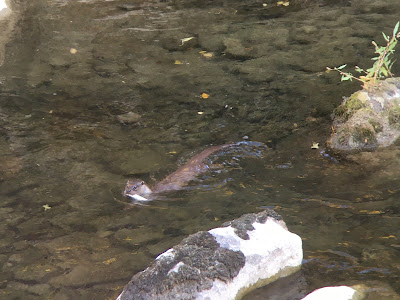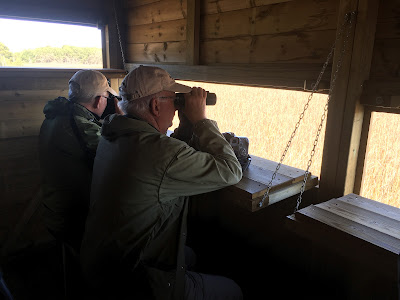Four
kind birdwatchers from Finland came recently to Navarra. Some of them had
already been in the area, but they wanted to try a different time of the year
with a very clear target in mind: Wallcreeper. So Jouko, Mauno, Jarmo and Kari
came in mid March as this in this time of the year the grey-black-white and red
birds are still in the lower parts of the mountain valleys.
We
spent two days guiding them with two purposes: get some ‘lifers’ and complete
their Spanish bird lists.
First
day was dedicated to the Southern part of Navarra visiting some steppe areas
and wetlands such as the Lor Lake and the Pitillas Lagoon. Despite the windy
weather we managed to hear (and see!) a few Dupont’s Larks in our first stop.
Other interesting birds in the area were Calandra Lark, Greater Short-toed
Lark, Thekla Lark and Dartford Warbler.
During the rest of the day we found and enjoyed with three Great Spotted
Cuckoos, A Golden Eagle, a couple of Hen Harriers, both Kite especies, Booted
and Short-toed Eagles and Bearded Reedlings among others, but we had luck and
got good views of two local rarities like e Great Northern Diver and a
Ring-necked Duck.
 |
| One of the many Red Kites we saw in these two days. |
 |
| Pitillas Lagoon Reserve |
 |
| The Great Northen Diver in the Lor Lake |
The
second day we went to the Roncal valley, in the Pyrenees. Weather forecast was
not very good, but we were lucky and avoid most of the announced rain. We started the day very well as we found a
Wild Cat close to the road; we could even take some pictures of it: great
moment!
In
the valley we had good sights of Griffon Vultures and Egyptian Vultures feeding
on a sheep carcass, many Red Kites, a group of 8 migrating Black Kites and a
Bearded Vulture flying close to us. The highest part in Larra Reserve was not
very busy with birds, but Red-billed and Alpine Choughs were trying to find
some food in the areas with less snow. And then, when we stopped in one of the
villages, we saw a small bird climbing in a sunny building’s wall: a
Wallcreeper! We also visited Arbaiun and Lumbier Gorge and we saw more Griffon,
Egyptian and Bearded Vultures, more Kites, more Choughs… and we added another
interesting species: Bonelli’s Eagle (two individuals).
The
day ended stopping in another place before returning to the hotel in order to
find the Black Woodpecker: we saw male and female quite well. This was the best
end we could expect for two fantastic days of birding in Navarra.
 |
| Bearded Vulture silhouette in the Ronal Valley sky. |
 |
| Surprise: a Wild Cat! |
 |
| Wallcreeper! |
 |
| Griffon and Egyptian Vulture resting after feeding |
 |
| The spectacular Arbaiun Gorge mirador |
Bird
list (100 species)
Mute
Swan (Cygnus olor)
Eurasian
Wigeon (Mareca penelope)
Gadwall
(Mareca strepera)
Mallard
(Anas platyrhynchos)
Northern
Shoveler (Spatula clypeata)
Common
Pochard (Aythya ferina)
Ring-necked
Duck (Aythya collaris)
Tufted
Duck (Aythya fuligula)
Red-legged
Partridge (Alectoris rufa)
Great
Northern Diver (Gavia immer)
Cattle
Egret (Bubulcus ibis)
Grey
Heron (Ardea cinerea)
White
Stork (Ciconia ciconia)
Little
Grebe (Tachybaptus ruficollis)
Great
Crested Grebe (Podiceps cristatus)
Black-necked
Grebe (Podiceps nigricollis)
Black
Kite (Milvus migrans)
Red
Kite (Milvus milvus)
Bearded
Vulture (Gypaetus barbatus)
Egyptian
Vulture (Neophron percnopterus)
Griffon
Vulture (Gyps fulvus)
Short-toed
Eagle (Circaetus gallicus)
Western
Marsh Harrier (Circus aeruginosus)
Hen
harrier (Circus cyaneus)
Eurasian
Sparrowhawk (Accipiter nisus)
Common
Buzzard (Buteo buteo)
Golden
Eagle (Aquila chrysaetos)
Booted
Eagle (Hieraaetus pennatus)
Bonelli’s
Eagle (Aquila fasciata)
Water
rail (Rallus aquaticus)
Eurasian
Coot (Fulica atra)
Northern
Lapwing (Vanellus vanellus)
Ruff
(Calidris pugnax)
Black-headed
Gull (Chroicocephalus ridibundus)
Yellow-legged
Gull (Larus michahellis)
Rock
Dove (Columba livia)
Common
Wood Pigeon (Columba palumbus)
Great
Spotted Cuckoo (Clamator glandarius)
Hoopoe
(Upupa epops)
Iberian
Green Woodpecker (Picus viridis sharpei)
Black
Woodpecker (Dryocopus martius)
Pico
picapinos (Dendrocopos major)
Common
Kestrel (Falco tinnunculus)
Merlin
(Falco columbarius)
Peregrine
falcon (Falco peregrinus)
Eurasian
Jay (Garrulus glandarius)
Common
Magpie (Pica pica)
Alpine
Chough (Pyrrhocorax graculus)
Red-billed
Chough (Pyrrhocorax pyrrhocorax)
Western
Jackdaw (Corvus monedula)
Carrion
Crow (Corvus corone)
Common
Raven (Corvus corax)
Firecrest
(Regulus ignicapilla)
Eurasian
Penduline Tit (Remiz pendulinus)
Crested
Tit (Lophophanes cristatus)
European
Blue Tit (Cyanistes caeruleus)
Great
Tit (Parus major)
Bearded
Reedling (Panurus biarmicus)
Common
Skylark (Alauda arvensis)
Thekla
Lark (Galerida theklae)
Crested
Lark (Galerida cristata)
Greater
Short-toed Lark (Chersophilus duponti)
Common
Sand Martin (Riparia riparia)
Eurasian
Crag martin (Ptyonoprogne rupestris)
Barn
Swallow (Hirundo rustica)
Common
House Martin (Delichon urbicum)
Cetti’s
Warbler (Cettia cetti)
Long-tailed
Tit (Aegithalos caudatus)
Common
Chiffchaff (Phylloscopus collybita)
Blackcap
(Sylvia atricapilla)
Dartford
Warbler (Sylvia undata)
Zitting
Cisticola (Cisticola juncidis)
Wallcreeper
(Tichodroma muraria)
European
Nuthatch (Sitta europea)
Short-toed
Treecreeper (Certhia brachydactyla)
Winter
Wren (Troglodytes troglodytes)
Spotless
Starling (Sturnus unicolor)
White-throated
Dipper (Cinclus cinclus)
Common
Blackbird (Turdus merula)
Song
Thrush (Turdus philomelos)
Mistle
Thrush (Turdus viscivorus)
European
Robin (Erithacus rubecula)
Black
Redstart (Phoenicurus ochruros)
Common
Stonechat (Saxicola rubicola)
House
Sparrow (Passer domesticus)
Common
Rock Sparrow (Petronia petronia)
Meadow
Pipit (Anthus pratensis)
Water
Pipit (Anthus spinoletta)
Grey
Wagtail (Motacilla cinerea)
White
wagtail (Motacilla alba)
Common
Chaffinch (Fringilla coelebs)
Hawfinch
(Coccothraustes coccothraustes)
European
Greenfinch (Chloris chloris)
Common
Linnet (Linaria cannabina)
European
Goldfinch (Carduelis carduelis)
European
Serin (Serinus serinus)
Eurasian
Siskin (Spinus spinus)
Cirl
Bunting (Emberiza cirlus)
Common
Reed Bunting (Emberiza schoeniclus)
Corn
Bunting (Emberiza calandra)
 |
| Finding new birds in Lumbier Gorge |
































